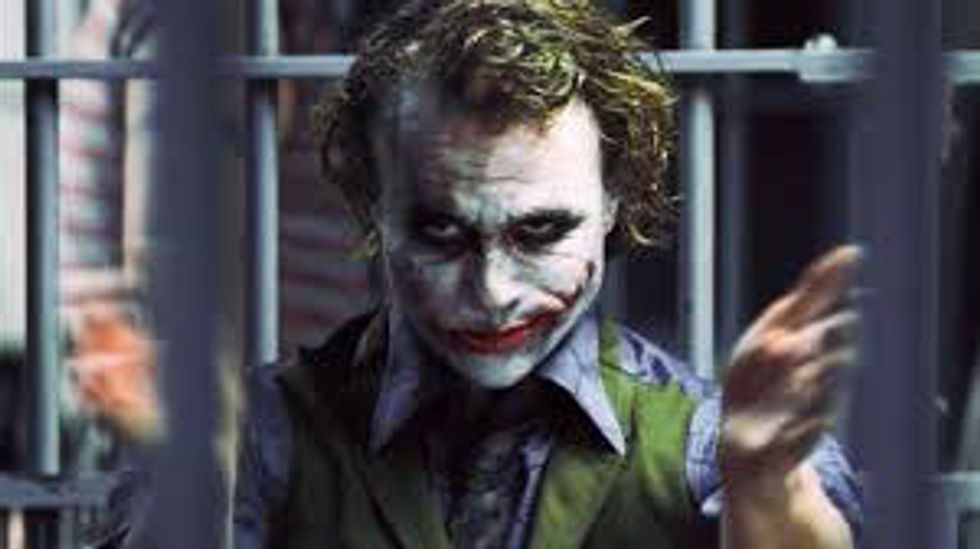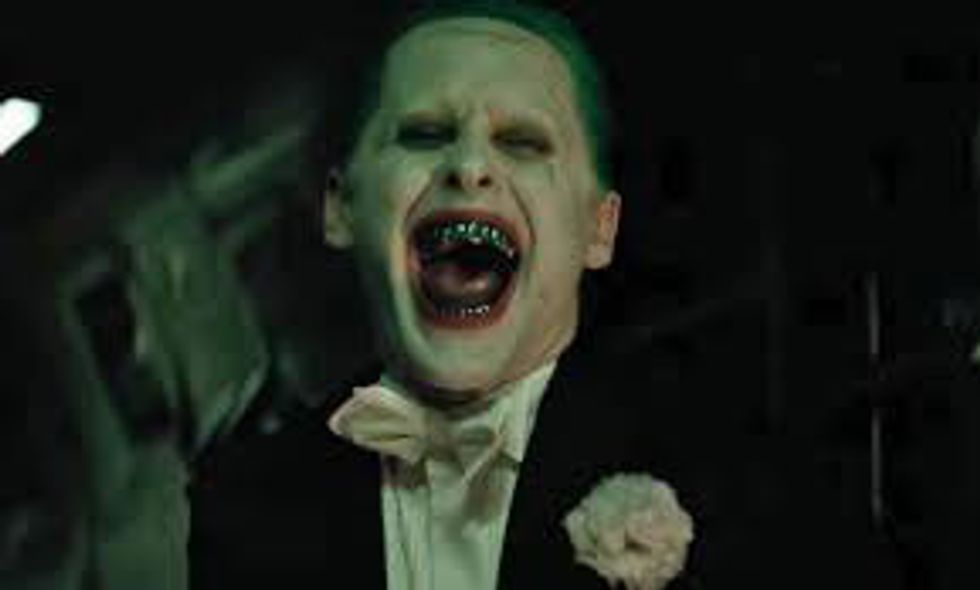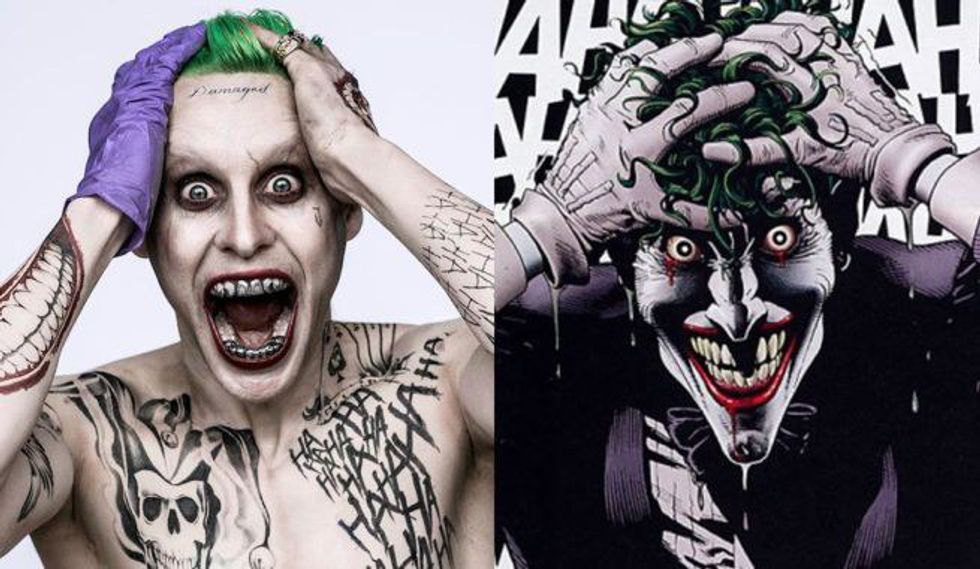I’ve watched “Batman vs. Superman: Dawn of Justice” four times since its release, seen Christopher Nolan’s “Dark Knight” trilogy at least twice over in its entirety, devoured “Batman: The Animated Series” and all the various other Detective Comics (DC) cartoon adaptations, and eagerly began to dip my toes in the expansive, glossy world of the comic books themselves. So, to say I was “excited” when news hit of a live-action adaptation of DC’s “The Suicide Squad”, —a comic series revived from the 1980s—is a grievous understatement. My excitement was transformed into sheer ecstasy when I learned that a new depiction of my all-time favorite DC character, The Joker, would make his debut as played by Jared Leto. Despite not really knowing Leto’s previous work, and knowing he would have to compete against the almost deified performance of Heath Ledger’s Joker in “The Dark Knight Returns”, I figured that any man who was willing to go up against the Batman was a man worth seeing. And, to set your minds at ease, dear readers, this article will not contain spoilers about the plot of the film, or the various other characters. Rather, it will be my best attempt at setting up a defense against the criticisms on Leto and his portrayal of my dear villain the Joker. But, to be safe, if you have not yet seen the film—which I urge you to do—proceed with caution.
After watching every trailer that I could dredge up and versing up on the publication history and previous adaptations of the Squad, my girlfriend and I set out on an adventure to see this wonder for ourselves—and arrived to over-packed theaters and jammed parking lots. Not to be dissuaded by a bit of overcrowding, we found a less liked cinema, strapped in, and let the show begin.
I allowed myself no bathroom breaks, lest I miss even one second of this new Clown Prince of Crime on the big screen, and I managed to see him all—all ten minutes of him. After the film had ended, I felt that I had, essentially, seen all there was to see of this new Joker in the trailers’ alone, which I had always felt gave away much too much footage anyways. However, seeing the new character integrated fully into the film made the experience that much better. I was still in love with the film itself, although much of my attention had been consumed with fantasies of Jared Leto pitting himself against the newcomer Ben Affleck as Batman, who had even less screen time than Leto did. To be fair, I knew coming into the film that the Joker, despite what people seemed to think, is not, and never was, a member of the rag-tag Suicide Squad. Even in the most recent cartoon film, “Batman: Assault on Arkham”, the Joker was nothing more than an inmate in the notorious Arkham Asylum, who, through a stroke of luck, escaped to become a foil to the anti-hero team. With that in mind, it was a gratuitous gift to the viewers’ that he was included in the film at all.
As I sat through the credits, still star-struck with the wonder I had just beheld, the looks of disappointment and mutters of contempt went largely unnoticed by me, and continued to be until the next day, when I shared my experience on social media. My excitement was met with general apathy, by viewer and conscientious resister alike, towards this new incarnation of the Joker. For the life of me, I couldn’t understand why. Leto’s portrayal gave a visually and conceptually new look to an old character, and fit perfectly within the new DC Universe (DCU) that “Man of Steel” and “Batman vs. Superman” had set the groundwork for. Furthermore, so many people had seemed to forget the recent 75th Anniversary of the entire Batman franchise, which had seen introductions, deaths, reimagining and rebirths of scores of beloved characters, my Joker included. Still, I met barrier after barrier against my reasoning for loving this new entity.
It was then that I realized what the problem was: I was fighting a surface battle. Many viewers were solely basing their opinions off of the precious little screen-time Leto had received, their dislike of Ben Affleck as the new Batman, or looking only at the narrow restrictions of the film itself, rather than the intricate, extended DCU that was being formed around it. So, determined, I put an open question to friends of mine on their opinions against this modern Clown Prince, as well as (begrudgingly) wading through the detritus of comment sections on sites such as “Rotten Tomatoes” and “IMDB”, in order to better understand the problems everyone was having with this clown. With responses in tow, I began to work against them steadily, picking apart the arguments in order to show the masses that this Joker may not be the villain this new Gotham deserved—but it was the one this new Universe needed. The comments ranged from simplistic, to rage-inducing, to the much-sought-after insightful bits, and to include them all would be mind-numbing, but I will include a few, as well as what I believe to be decent arguments in the Prince’s defense, so maybe we can understand that we hate him for all the reasons he would want to be hated.
“His tattoos are stupid.”
This was not the first time since the film’s release that I had seen this rather curt opinion. Many fans have grown accustomed to the "classic" look of the Joker: Purple vests and comically long pants, a flower at the lapel, and a toy or two hanging about his person.This means that any alteration to the fiercely loved aesthetic needs to be justified. In a scathing article I found on Grunge.com—and there are no shortage of articles, but this was the first I had seen—a similar comment is made in the form of “Those Tattoos Are Just Dumb”. The author of the article writes, “[The tattoos] makes it look like the Joker went nuts one weekend to get every clown-themed tattoo he could pick off the shop wall. Then when he ran out he told the artist, "just put a bunch of 'ha ha's anywhere else. I guess." What shocks me isn’t the “put down”, but that this strikes viewers as something that the Joker, a sociopathic, murdering, satirical blot on Gotham society, wouldn’t do. I can picture it as I write it:
A tattoo artist is finishing up his most recent client. It’s late in the night, both customer and artist are exhausted from another uneventful, boring Gotham night. The bell on the front door rings from the front room, alerting the artist to a new patron. “Just a sec,” he yells, slipping up with his needle and eliciting a hiss from the muscular fellow in his chair. Suddenly, a shot rings out and the man in the chair slumps forward, a ragged hole placed right between his eyes. “Sorry, I got tired of waiting,” the newcomer mumbles, seemingly embarrassed, as he shoves the dead man off the chair and takes a seat, resting his heels on the still cooling body before him. The artist isn’t stunned by the act of senseless violence; it’s Gotham, and this is just another Tuesday. What sets his heart racing is the appearance of the new man in the chair, so casual as he inspects the walls. This man is The Joker, the Clown Prince of Crime himself, clothed in a gaudy purple leather jacket with matching pants, chains hanging from his neck. If he wanted money, the artist would be dead already. That meant he was here for one thing: a tattoo. So, listening to the Joker’s bored requests, the artist hurriedly begins applying every clown motif print he can find on his walls, and in his terrified head. He even adds the ridiculous looking and elegant “Damaged” lettering on his forehead, something he’d advise against for any other customer, but dare not do now. And soon he realizes, he’s run out of prints. He panics as this man looks at him, grinning, ugly metal grill dull in the poor lighting. “Heh…just put a bunch of ‘ha ha’s anywhere else. I guess.” The artist does as he’s told, and finally the Joker stands, eying the work as he pulls his jacket over the still raw, white skin. “Wow, pal, you did a terrific job. I love it. It’s so…so me.” The Joker giggles, idly pulling his pistol up and shooting the artist right in the heart, walking towards the door before he even drops dead.
And with a little imagination, we can see a possible way those “dumb tattoos” arrived on screen.
“Leto didn’t outdo Ledger’s performance.”
I particularly dislike this argument, for two reasons; it, 1) Seems to ignore the copious small changes to the character of the Joker over 75 years, and 2) Goes against Leto’s own purpose. During an interview with IGN, he stated right off when asked about comparisons to the other Jokers’ on the big screen—including Nicholson, Romero and the infamous Ledger—that he needed to go in a completely different direction, because it was impossible to outdo such amazing representations. Each actor portrayed the Joker in a different social, political, and comic-book light. Cesar Romero, in his rendition during the 1960s Batman TV series, starring Adam West as the Caped Crusader, was gimmicky, cheesy, and all-around goofy—which was befitting of the time period. Jack Nicholson sported a darker, gangster-inspired Joker in Tim Burton’s “Batman” of 1989, coming into a more modern—but still dated—depiction of criminal. Then, we reach the critically acclaimed performance of Heath Ledger in Christopher Nolan’s “The Dark Knight” of 2008, replete with all the new film industry tricks and technologies fitting a new-age Batman film. Each Joker, however much loved or despised, is incomparable to one another, because they are time-locked into the era and incarnation they appear in. Romero would never imagine gassing an entire town, Ledger never pulled a stunt on a giant clown balloon, and Leto was unable to face Batman in a political landscape like Ledger—and unable to undo his persona, unlike Ledger’s painted-on white coloring and dyed hair, a character choice befitting the appearance of Nolan’s self-made villains. This argument segues into the next one perfectly.
“I’d expected him to have me…on the edge of my seat with what crazy shit he’d come up with next.”
It’s important to remember exactly what DCU Leto’s Joker inhabits. It’s not the peppy Americanized world of Romero, the noir Gotham of Burton, or the grunge-esque Gotham of Nolan and its accompanying anarchic political battles. The Gotham of Leto is set against a backdrop of a co-existing Superman, a god-like figure of immense power and influence. Despite many fans being aware of the usual pairing of Batman/Superman in printed and cartoon media, the other live-action movies and shows did not include this world-shattering figure, and frequently altered the fabric of their characters. An example of the difference between a tame and un-tamed Gotham is in Nolan’s films. Bane—who, in most media, is depicted as a drug-fueled, semi-monster of a man—is seen instead as a hired hit-man, an anarchist who has his own tragic creation, but is in no way a bulging veined behemoth. The presence or absence of “meta-humans”, than, has a profound influence on the world.
Leto, on the other hand, lives in a Gotham that saw a neighboring Metropolis—and the very world itself—threatened by an alien invasion that leveled an entire city. He lives in a world that saw the Dark Knight clash with who he saw as a False God, as well as team up with a mythological super-woman against an existential threat to mankind—all in his own back yard. The “crazy shit” has already happened, dear readers: Aliens, goddesses, monsters and Christ-figures. Men like Batman and the Joker have ultimately realized they are mere mundane men, not gifted with superpowers and meta-human status, a set of facts Batman is now painfully aware of. In other words, the vision of this DCU is one of ordinary crime escalating in the face of cosmic threats to humanity’s existence. Furthermore, despite these existential quandaries of supermen and the truth of life on other planets, these films have been bound consistently within a PG-13 rating,That being said, the chaos and “crazy shit” can only go so far, and as Leto has stated in various other interviews, this disappoints and frustrates him as well.
The lesson against these arguments is this: a character’s abilities, appearance and personality depend heavily upon the story they are woven into. While Ledger’s Joker is a common comeback against Leto’s, Ledger's fans fail to see that his backstory has totally broken free of the “original” design of the Joker. There was no life-changing chemical bath, as evidenced by the flashes of peach-colored skin through the paint-destroying sweat. There are no “BANG!” gun gimmicks, nor an accompanying love-interest of Harley Quinn. Ledger’s Joker is one of social morality, who seeks to challenge the ethics of an all-too-human Gotham. Leto, however, is placed in a Gotham that has been shoved down the evolutionary ladder by the appearance of monsters from the sky. There is no longer any room to question morality, or to hatch political plots—life has come too close to eradication too many times to care anymore. This Joker, in the face of gods and demons, wonder-women and crocodile men, has settled in to being the Clown Prince of Crime. He’s a gangster, who sits behind the seat of a purple Lamborghini, mastering the over-streets as well as the underworld. The common criminal fears him, the Batman cannot catch him, and he stands no chance against the likes of Superman. In the Grunge article I included above, it was stated that Leto “seems intent on pushing the evil angle as hard as possible”. Again, this can be viewed as a critique, or as a reality of this new Gotham we are being handed. The “evil angle” has already been pushed by Kryptonians seeking to destroy an entire planet for their benefit, by a Bruce Wayne who would be willing to slay the Christ of the common man in order to solidify his own brand of justice, by an Alexander Luthor who wants nothing more than to destroy the comforting idea of a benevolent God. In other words, this Joker is right at home as a Harley Quinn-toting, tattooed, Lamborghini driving, laughing sociopath. In the face of gods and monsters, what better reaction is there than to laugh?
The Last Laugh...
In the end, the criticism and dislike of Leto’s six-month project in method acting will still stand, regardless of any defense. There will be the Ledger legion, devoted to the post-mortem awards the self-made Joker received. There will be those that still pine for the days when the Joker lived soley between the pages of a comic book, throwing gimmick after joke at his mortal foes. There will be those who only wish for Mark Hamill to continue to lend us his spine-chilling and iconic laugh to cartoon media and video games. Myself, on the other hand, am ecstatic about this newfound Joker that may or may not live to laugh again in some future film.
In the “Batman vs. Superman” film, which preceded Leto's appearance as Joker, an exchange happens between Batman and his faithful butler, Alfred, which further solidifies the reality of a chaotic universe:
Bruce Wayne: We're criminals, Alfred. We've always been criminals. Nothing's changed.
Alfred: Oh, yes it has, sir. Everything's changed. Men fall from the sky, the gods hurl thunderbolts, innocents die. That's how it starts, sir. The fever, the rage, the feeling of powerlessness that turns good men... cruel.
Cruelty is a reality in this world. Bruce Wayne, even as the avenging hero Batman, has to face his “powerlessness” and overcome it to maintain his sense of justice. Later, during his battle with Superman, Bruce continues this idea when he mocks Superman, “I bet your parents taught you that you mean something, that you’re here for a reason. My parents taught me a different lesson, dying in a gutter for no reason at all…they taught me the world only makes sense if you force it to.” Akin to Jean Paul-Sartre's "condemned to freedom", this Gotham is the Gotham of the Existentialist, where life seemingly serves no purpose, and hero’s must justify their own rise. Innocents die, monsters wage wars, and the good people are left trying to make a purpose for themselves. The question is, then, what happens when, in the face of that meaninglessness, you don’t choose purpose, or heroism, or good? What if you choose to be a heathen, to glorify yourself in tattoos proclaiming your power, to jump behind the wheel of your anti-Batmobile, to take control of a woman, warp her mind, and proclaim her your own sidekick? What happens when acid seeps into your skin, forever changing you on the outside and in, and your teeth are punched out by a man who dresses like a bat, and you replace what little was left of your original self with cold metal? What happens when you choose crime and madness and suits and humor?
You laugh. You joke. You become a parody of it all, the crime and monsters and heroes.
You become the Joker of a new, senseless world. And you do a damn good job at it.

























